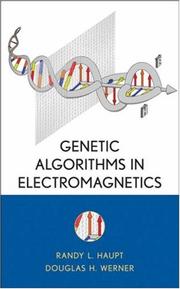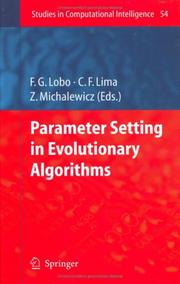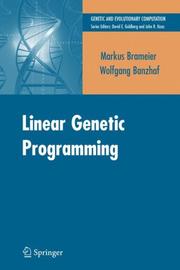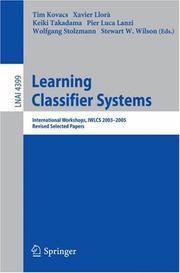| Listing 1 - 10 of 15 | << page >> |
Sort by
|

ISBN: 9781846285998 Year: 2007 Publisher: London Springer
Abstract | Keywords | Export | Availability | Bookmark
 Loading...
Loading...Choose an application
- Reference Manager
- EndNote
- RefWorks (Direct export to RefWorks)
Computer composition --- Evolutionary computation --- Genetic algorithms

ISBN: 0470653450 1280826711 9786610826711 047010628X 0470106271 9780470106280 9780471488897 Year: 2007 Publisher: Hoboken, New Jersey : IEEE Press :
Abstract | Keywords | Export | Availability | Bookmark
 Loading...
Loading...Choose an application
- Reference Manager
- EndNote
- RefWorks (Direct export to RefWorks)
A thorough and insightful introduction to using genetic algorithms to optimize electromagnetic systems Genetic Algorithms in Electromagnetics focuses on optimizing the objective function when a computer algorithm, analytical model, or experimental result describes the performance of an electromagnetic system. It offers expert guidance to optimizing electromagnetic systems using genetic algorithms (GA), which have proven to be tenacious in finding optimal results where traditional techniques fail. Genetic Algorithms in Electromagnetics begins with an introduction to optimization and several commonly used numerical optimization routines, and goes on to feature: . Introductions to GA in both binary and continuous variable forms, complete with examples of MATLAB(r) commands. Two step-by-step examples of optimizing antenna arrays as well as a comprehensive overview of applications of GA to antenna array design problems. Coverage of GA as an adaptive algorithm, including adaptive and smart arrays as well as adaptive reflectors and crossed dipoles. Explanations of the optimization of several different wire antennas, starting with the famous "crooked monopole". How to optimize horn, reflector, and microstrip patch antennas, which require significantly more computing power than wire antennas. Coverage of GA optimization of scattering, including scattering from frequency selective surfaces and electromagnetic band gap materials. Ideas on operator and parameter selection for a GA. Detailed explanations of particle swarm optimization and multiple objective optimization. An appendix of MATLAB code for experimentation.
Antenna arrays --- Electromagnetism --- Genetic algorithms. --- Design. --- Mathematical models.
Book
ISBN: 1000006634 3866441282 Year: 2007 Publisher: KIT Scientific Publishing
Abstract | Keywords | Export | Availability | Bookmark
 Loading...
Loading...Choose an application
- Reference Manager
- EndNote
- RefWorks (Direct export to RefWorks)
This book develops efficient methods for the application of Evolutionary Algorithms on stochastic problems. To achieve this, procedures for statistical selection are systematically analyzed with respect to different measures and significantly improved. It is shown how to adapt one of the best procedures for the needs of Evolutionary Algorithms and Evolutionary operators for efficient implementation in stochastic environments are identified.
Evolutionary Algorithm --- Uncertainty --- Simulation based optimization --- Bayes --- Ranking & Selection --- Genetic Algorithms
Book
ISBN: 9781595936974 Year: 2007 Publisher: New York (N.Y.) : ACM,
Abstract | Keywords | Export | Availability | Bookmark
 Loading...
Loading...Choose an application
- Reference Manager
- EndNote
- RefWorks (Direct export to RefWorks)
Book
Year: 2007 Publisher: [Place of publication not identified] Association for Computing Machinery
Abstract | Keywords | Export | Availability | Bookmark
 Loading...
Loading...Choose an application
- Reference Manager
- EndNote
- RefWorks (Direct export to RefWorks)
Book
ISBN: 9783540731917 3540731911 9786610955466 1280955465 354073192X Year: 2007 Publisher: Berlin, Germany ; New York, New York : Springer,
Abstract | Keywords | Export | Availability | Bookmark
 Loading...
Loading...Choose an application
- Reference Manager
- EndNote
- RefWorks (Direct export to RefWorks)
This book is devoted to the application of genetic algorithms in continuous global optimization. Some of their properties and behavior are highlighted and formally justified. Various optimization techniques and their taxonomy are the background for detailed discussion. The nature of continuous genetic search is explained by studying the dynamics of probabilistic measure, which is utilized to create subsequent populations. This approach shows that genetic algorithms can be used to extract some areas of the search domain more effectively than to find isolated local minima. The biological metaphor of such behavior is the whole population surviving by rapid exploration of new regions of feeding rather than caring for a single individual. One group of strategies that can make use of this property are two-phase global optimization methods. In the first phase the central parts of the basins of attraction are distinguished by genetic population analysis. Afterwards, the minimizers are found by convex optimization methods executed in parallel.
Genetic algorithms --- Evolutionary computation. --- Combinatorial optimization. --- Réseaux neuronaux à structure évolutive --- Optimisation combinatoire --- Mathematical models. --- Data processing. --- Genetic algorithms -- Data processing. --- Genetic algorithms -- Mathematical models. --- Combinatorial optimization, --- Evolutionary computation --- Engineering & Applied Sciences --- Civil & Environmental Engineering --- Operations Research --- Civil Engineering --- Computer Science --- Applied Mathematics --- Data processing --- Optimization, Combinatorial --- Computation, Evolutionary --- GAs (Algorithms) --- Genetic searches (Algorithms) --- Engineering. --- Artificial intelligence. --- Applied mathematics. --- Engineering mathematics. --- Appl.Mathematics/Computational Methods of Engineering. --- Artificial Intelligence (incl. Robotics). --- Engineering --- Engineering analysis --- Mathematical analysis --- AI (Artificial intelligence) --- Artificial thinking --- Electronic brains --- Intellectronics --- Intelligence, Artificial --- Intelligent machines --- Machine intelligence --- Thinking, Artificial --- Bionics --- Cognitive science --- Digital computer simulation --- Electronic data processing --- Logic machines --- Machine theory --- Self-organizing systems --- Simulation methods --- Fifth generation computers --- Neural computers --- Construction --- Industrial arts --- Technology --- Mathematics --- Combinatorial analysis --- Mathematical optimization --- Neural networks (Computer science) --- Algorithms --- Combinatorial optimization --- Genetic programming (Computer science) --- Learning classifier systems --- Mathematical and Computational Engineering. --- Artificial Intelligence.

ISBN: 9783540694311 3540694315 9786610816941 1280816945 3540694323 Year: 2007 Volume: 54 Publisher: Berlin, Germany ; New York, New York : Springer-Verlag,
Abstract | Keywords | Export | Availability | Bookmark
 Loading...
Loading...Choose an application
- Reference Manager
- EndNote
- RefWorks (Direct export to RefWorks)
One of the main difficulties of applying an evolutionary algorithm (or, as a matter of fact, any heuristic method) to a given problem is to decide on an appropriate set of parameter values. Typically these are specified before the algorithm is run and include population size, selection rate, operator probabilities, not to mention the representation and the operators themselves. This book gives the reader a solid perspective on the different approaches that have been proposed to automate control of these parameters as well as understanding their interactions. The book covers a broad area of evolutionary computation, including genetic algorithms, evolution strategies, genetic programming, estimation of distribution algorithms, and also discusses the issues of specific parameters used in parallel implementations, multi-objective evolutionary algorithms, and practical consideration for real-world applications. It is a recommended read for researchers and practitioners of evolutionary computation and heuristic methods.
Evolutionary computation --- Genetic algorithms --- Réseaux neuronaux à structure évolutive --- Algorithmes génétiques --- Electronic books. -- local. --- Evolutionary computation -- Congresses. --- Genetic algorithms -- Congresses. --- Operations Research --- Applied Mathematics --- Civil Engineering --- Computer Science --- Civil & Environmental Engineering --- Engineering & Applied Sciences --- Evolutionary computation. --- Genetic algorithms. --- Engineering. --- Artificial intelligence. --- Applied mathematics. --- Engineering mathematics. --- Appl.Mathematics/Computational Methods of Engineering. --- Artificial Intelligence (incl. Robotics). --- Mathematical and Computational Engineering. --- Artificial Intelligence. --- AI (Artificial intelligence) --- Artificial thinking --- Electronic brains --- Intellectronics --- Intelligence, Artificial --- Intelligent machines --- Machine intelligence --- Thinking, Artificial --- Bionics --- Cognitive science --- Digital computer simulation --- Electronic data processing --- Logic machines --- Machine theory --- Self-organizing systems --- Simulation methods --- Fifth generation computers --- Neural computers --- Engineering --- Engineering analysis --- Mathematical analysis --- Mathematics --- Computation, Evolutionary --- Neural networks (Computer science) --- GAs (Algorithms) --- Genetic searches (Algorithms) --- Algorithms --- Combinatorial optimization --- Genetic programming (Computer science) --- Learning classifier systems

ISBN: 1280800259 9786610800254 0387310304 0387310290 1441940480 Year: 2007 Publisher: New York, NY : Springer US : Imprint: Springer,
Abstract | Keywords | Export | Availability | Bookmark
 Loading...
Loading...Choose an application
- Reference Manager
- EndNote
- RefWorks (Direct export to RefWorks)
Linear Genetic Programming examines the evolution of imperative computer programs written as linear sequences of instructions. In contrast to functional expressions or syntax trees used in traditional Genetic Programming (GP), Linear Genetic Programming (LGP) employs a linear program structure as genetic material whose primary characteristics are exploited to achieve acceleration of both execution time and evolutionary progress. Online analysis and optimization of program code lead to more efficient techniques and contribute to a better understanding of the method and its parameters. In particular, the reduction of structural variation step size and non-effective variations play a key role in finding higher quality and less complex solutions. This volume investigates typical GP phenomena such as non-effective code, neutral variations and code growth from the perspective of linear GP. The text is divided into three parts, each of which details methodologies and illustrates applications. Part I introduces basic concepts of linear GP and presents efficient algorithms for analyzing and optimizing linear genetic programs during runtime. Part II explores the design of efficient LGP methods and genetic operators inspired by the results achieved in Part I. Part III investigates more advanced techniques and phenomena, including effective step size control, diversity control, code growth, and neutral variations. The book provides a solid introduction to the field of linear GP, as well as a more detailed, comprehensive examination of its principles and techniques. Researchers and students alike are certain to regard this text as an indispensable resource.
Genetic programming (Computer science) --- Linear programming. --- Production scheduling --- Programming (Mathematics) --- Computer programming --- Genetic algorithms --- Artificial intelligence. --- Information theory. --- Artificial Intelligence. --- Theory of Computation. --- Communication theory --- Communication --- Cybernetics --- AI (Artificial intelligence) --- Artificial thinking --- Electronic brains --- Intellectronics --- Intelligence, Artificial --- Intelligent machines --- Machine intelligence --- Thinking, Artificial --- Bionics --- Cognitive science --- Digital computer simulation --- Electronic data processing --- Logic machines --- Machine theory --- Self-organizing systems --- Simulation methods --- Fifth generation computers --- Neural computers --- Computers. --- Automatic computers --- Automatic data processors --- Computer hardware --- Computing machines (Computers) --- Electronic calculating-machines --- Electronic computers --- Hardware, Computer --- Computer systems --- Calculators --- Cyberspace

ISBN: 9783540712305 3540712305 9786610938391 1280938390 3540712313 Year: 2007 Publisher: Berlin ; Heidelberg : Springer-Verlag,
Abstract | Keywords | Export | Availability | Bookmark
 Loading...
Loading...Choose an application
- Reference Manager
- EndNote
- RefWorks (Direct export to RefWorks)
The work embodied in this volume was presented across three consecutive e- tions of the International Workshop on Learning Classi?er Systems that took place in Chicago (2003), Seattle (2004), and Washington (2005). The Genetic and Evolutionary Computation Conference, the main ACM SIGEvo conference, hosted these three editions. The topics presented in this volume summarize the wide spectrum of interests of the Learning Classi?er Systems (LCS) community. The topics range from theoretical analysis of mechanisms to practical cons- eration for successful application of such techniques to everyday data-mining tasks. When we started editing this volume, we faced the choice of organizing the contents in a purely chronologicalfashion or as a sequence of related topics that help walk the reader across the di?erent areas. In the end we decided to or- nize the contents by area, breaking the time-line a little. This is not a simple endeavor as we can organize the material using multiple criteria. The tax- omy below is our humble e?ort to provide a coherent grouping. Needless to say, some works may fall in more than one category. The four areas are as follows: Knowledge representation. These chapters elaborate on the knowledge r- resentations used in LCS. Knowledge representation is a key issue in any learning system and has implications for what it is possible to learn and what mechanisms shouldbe used. Four chapters analyze di?erent knowledge representations and the LCS methods used to manipulate them.
Machine learning --- Apprentissage automatique --- Congresses. --- Congrès --- Electronic books. -- local. --- Genetic algorithms -- Congresses. --- Machine learning -- Congresses. --- Reinforcement learning -- Congresses. --- Mechanical Engineering --- Engineering & Applied Sciences --- Computer Science --- Mechanical Engineering - General --- Information Technology --- Artificial Intelligence --- Genetic algorithms --- Reinforcement learning --- Computer science. --- Computers. --- Mathematical logic. --- Data mining. --- Artificial intelligence. --- Computer Science. --- Artificial Intelligence (incl. Robotics). --- Computation by Abstract Devices. --- Mathematical Logic and Formal Languages. --- Data Mining and Knowledge Discovery. --- AI (Artificial intelligence) --- Artificial thinking --- Electronic brains --- Intellectronics --- Intelligence, Artificial --- Intelligent machines --- Machine intelligence --- Thinking, Artificial --- Bionics --- Cognitive science --- Digital computer simulation --- Electronic data processing --- Logic machines --- Machine theory --- Self-organizing systems --- Simulation methods --- Fifth generation computers --- Neural computers --- Algorithmic knowledge discovery --- Factual data analysis --- KDD (Information retrieval) --- Knowledge discovery in data --- Knowledge discovery in databases --- Mining, Data --- Database searching --- Algebra of logic --- Logic, Universal --- Mathematical logic --- Symbolic and mathematical logic --- Symbolic logic --- Mathematics --- Algebra, Abstract --- Metamathematics --- Set theory --- Syllogism --- Automatic computers --- Automatic data processors --- Computer hardware --- Computing machines (Computers) --- Electronic calculating-machines --- Electronic computers --- Hardware, Computer --- Computer systems --- Cybernetics --- Calculators --- Cyberspace --- Informatics --- Science --- Reinforcement (Psychology) --- Learning classifier systems --- Artificial Intelligence.
Book
ISBN: 9783540732969 3540732969 3540732977 Year: 2007 Publisher: Berlin, Germany ; New York, United States : Springer,
Abstract | Keywords | Export | Availability | Bookmark
 Loading...
Loading...Choose an application
- Reference Manager
- EndNote
- RefWorks (Direct export to RefWorks)
Hybridization of evolutionary algorithms is getting popular due to their capabilities in handling several real world problems involving complexity, noisy environment, imprecision, uncertainty and vagueness. This edited volume is targeted to present the latest state-of-the-art methodologies in ’Hybrid Evolutionary Algorithms’. This book deals with the theoretical and methodological aspects, as well as various applications to many real world problems from science, technology, business or commerce. This volume comprises of 14 chapters including an introductory chapter giving the fundamental definitions and some important research challenges. Chapters were selected on the basis of fundamental ideas/concepts rather than the thoroughness of techniques deployed.
Evolutionary programming (Computer science) --- Evolutionary computation. --- Genetic algorithms. --- Programmation évolutive --- Réseaux neuronaux à structure évolutive --- Algorithmes génétiques --- Evolutionary computation --- Genetic algorithms --- Applied Mathematics --- Civil Engineering --- Computer Science --- Engineering & Applied Sciences --- Civil & Environmental Engineering --- 519.1 --- 681.3*G21 --- 681.3*I2 --- Combinatorics. Graph theory --- Combinatorics: combinatorial algorithms; counting problems; generating functions; permutations and combinations; recurrences and difference equations --- Artificial intelligence. AI --- 519.1 Combinatorics. Graph theory --- 681.3*I2 Artificial intelligence. AI --- 681.3*G21 Combinatorics: combinatorial algorithms; counting problems; generating functions; permutations and combinations; recurrences and difference equations --- GAs (Algorithms) --- Genetic searches (Algorithms) --- Computation, Evolutionary --- Computer science. --- Artificial intelligence. --- Computer-aided engineering. --- Applied mathematics. --- Engineering mathematics. --- Computer Science. --- Computer-Aided Engineering (CAD, CAE) and Design. --- Appl.Mathematics/Computational Methods of Engineering. --- Artificial Intelligence (incl. Robotics). --- Algorithms --- Combinatorial optimization --- Genetic programming (Computer science) --- Learning classifier systems --- Computer programming --- Neural networks (Computer science) --- Engineering --- Engineering analysis --- Mathematical analysis --- CAE --- AI (Artificial intelligence) --- Artificial thinking --- Electronic brains --- Intellectronics --- Intelligence, Artificial --- Intelligent machines --- Machine intelligence --- Thinking, Artificial --- Bionics --- Cognitive science --- Digital computer simulation --- Electronic data processing --- Logic machines --- Machine theory --- Self-organizing systems --- Simulation methods --- Fifth generation computers --- Neural computers --- Informatics --- Science --- Mathematics --- Data processing --- Computer aided design. --- Mathematical and Computational Engineering. --- Artificial Intelligence. --- CAD (Computer-aided design) --- Computer-assisted design --- Computer-aided engineering --- Design
| Listing 1 - 10 of 15 | << page >> |
Sort by
|

 Search
Search Feedback
Feedback About
About Help
Help News
News